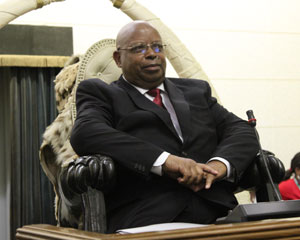
The Speaker of Parliament Jacob Mudenda was quoted on July 21 2014 saying that the Parliament’s Human Resources Committee is finalising the shortlisting of candidates to be appointed as commissioners for the independent commissions.
BY DZIKAMAI BERE & PROSPER MAGUCHU
The commissions referred to by the Speaker are the five commissions established by Chapter 12 of Zimbabwe’s new constitution.
These five include the National Peace and Reconciliation Commission (NPRC). The very first function of the NPRC is stated in the constitution as to ensure post-conflict justice, healing and reconciliation. What a mammoth task!
We can safely say the NPRC is designed to deal with Zimbabwe’s problem of violence, and anyone who has worked with survivors of violence and torture in this country knows that this is not a simple task.
The NPRC itself cannot deal with this problem but can only spearhead a national process. Our “elected Parliament” does not seem to believe that this should be an inclusive process. In this piece we show why this attitude by the Parliament will give the NPRC a stillbirth.
Creating a commission with such a huge mandate is not a walk in the park. Its success is predicated upon one fundamental principle of democracy-popular participation. A particularly important group are the survivors of past violations whose welfare inspired the creation of such a commission.
Instead, the Committee on Standing Rules and Orders (CSRO) is making it a private affair. To begin with, the constitution requires the participation of the public in nominating candidates for possible appointment to the commission.
- Chamisa under fire over US$120K donation
- Mavhunga puts DeMbare into Chibuku quarterfinals
- Pension funds bet on Cabora Bassa oilfields
- Councils defy govt fire tender directive
Keep Reading
The CSRO has been insincere and has shown a lack of commitment to the inclusivity of the process. On April 23 2014, it issued a call for nominations to the commissions. The call was published on the Parliament’s website and in the leading daily papers. The call was issued only in English and only in print media.
Now it is important to note that the constitution recognises 16 official languages. It further goes on to say that “the State and all institutions and agencies of government must take into account the language preferences of people affected by governmental measures or communication.” (Section 6 (3)(b)).
This means that by virtue of its exclusiveness to English speaking newspaper-readers and web-browsers, the call was inadequate. It is susceptible to a challenge at law because it violates one of the seven founding provisions of the constitution, hence depriving the majority of Zimbabweans the opportunity to participate in the nomination process.
In a recent ICTJ report on Truth Commissions, Kofi Annan, the former UN Secretary General states, “…sustainable peace requires more than agreements between leaders: it requires institutions that are worthy of trust, that respect human rights. In turn, these institutions require the confidence of citizens who previously only had reasons to distrust state authorities.”
In May 2014, before the closure of the call for nominations, more than 25 civil society organisations petitioned the Speaker of Parliament requesting extension of the deadline and wider publicity to allow for increased public participation.
The Speaker of Parliament decided to ignore the petition. It is very clear from this attitude that the Parliament has decided to disregard the citizens and move on with establishing a private commission with total disregard whatsoever of the views of the citizens. Because of this very reason, we foresee the stillbirth of the NPRC.
This is not the only problem with the current process. Another problem which is probably the reason why we are experiencing a total disregard for the views of the people is that the operating environment in which the NPRC is being established is no different from the environment in which the violations it wishes to address were committed.
There are no measures to ensure the security of survivors of past violations and to protect them in their interaction with the commission. How do you achieve justice and reconciliation within an ongoing state of impunity?
How do you convince survivors that it is safe to approach the commission without putting in place the necessary framework to ensure their protection?
The commission itself does not have an enabling law to lay down the basics of how it is going to operate. This creates the same challenges experienced in the establishment of the Human Rights Commission which, five years later, does not have a secretariat. Zimbabwe has had a number of official commissions and committees before.
The NPRC with its huge mandate and enormous legal and moral obligations is without precedents in Zimbabwe.
It requires a strong foundation and credible guidance. It requires the participation of the citizens, especially the survivors of past violations.
It needs to earn the confidence of the people that it is different from other pseudo-transitional justice measures being thrown around to hoodwink the local and international community. What we are currently having is quite the opposite and this sets the NPRC for certain failure. From where we stand, it appears this is by design.
Dzikamai Bere and Prosper Maguchu contribute to this column in their individual capacities. The views contained here are not the views of the organisations they are associated with.











